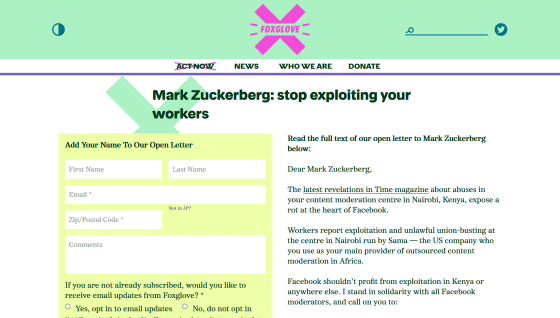A moderator with an hourly wage of only 170 yen is checking Facebook content in Africa in a poor working environment.

by
Many photos and videos are posted daily on Facebook, including content that violates the guidelines for pornography and violence. Many of the moderators who crack down on this content are suffering from mental health problems and poor working conditions due to the stress of continuing to watch harmful content. Time , a new American news magazine, has reported on the difficult situation of Facebook content moderators working in Kenya 's offices in East Africa.
Inside Facebook's African Sweatshop | Time
https://time.com/6147458/facebook-africa-content-moderation-employee-treatment/

Facebook under fire for poor treatment of African content moderators | TechCabal
https://techcabal.com/2022/02/14/facebook-fire-for-poor-treatment-of-african-content-moderators/
In an office building on the outskirts of Nairobi, the capital of Kenya, about 200 young people from all over Africa work as Facebook content moderators. These young people are not hired directly by Facebook, but by a subcontractor called Sama , headquartered in California, USA. Sama advertises itself as 'outsourcing ethical AI,' and is providing data and verifying machine learning algorithms mainly in countries with low average income.
Sama has been undertaking Facebook content moderation in sub-Saharan Africa since early 2019, hiring at least 11 language-speaking employees from African countries. Some of the content monitored by Kenyan moderators is posted in areas where violence and hatred are occurring, such as Ethiopia, where the civil war is intensifying, and the burden on the moderators is heavy. increase.
However, Kenyan moderators, who play an important role for Facebook, are suffering from problems such as very low wages and suppression of the labor movement, in addition to work stress. Time interviewed more than 12 Sama employees and former employees, and based on documents such as emails and pay slips, summarized the situation of African moderators.
One moderator told Time, 'Our job is a kind of mental torture. I live that day and can't save. Sometimes I want to retire, but I tell myself. What does my baby eat? ' According to Time, two employees retired after being diagnosed with mental illness such as depression and PTSD, and several ex-employees have not been diagnosed with mental illness due to financial problems. He said he retired due to mental health problems.

According to the salary statement confirmed by Time, Sama pays employees collected from abroad about $ 528 per month (about 60,900 yen) before tax, and the salary after tax is about $ 440 (about 5) per month. The hourly wage after tax is about 2.2 dollars (about 250 yen). This includes a bonus from moving to Kenya from a foreign country, and Kenyan employees who have not paid the bonus are said to have an hourly wage after tax of about $ 1.46 (about 170 yen).
According to a (PDF file)
So, in July 2019, a South African moderator, Daniel Motaung, organized more than 100 employees and negotiated to improve working conditions. Employees have drafted a petition requesting 'doubling the salary of all employees,' and said that if management does not start responding to the request within seven days, they will go on strike. Motaung said in the negotiations that Sama was a subcontractor of Facebook and speculated that if a strike slowed down moderation of content, Facebook could also put pressure on improving treatment. ..
However, a senior executive at the California headquarters responded to employee requests in a video conference that the wages that Sama's moderators are getting are quite high in Kenya. Within a few more days, two senior executives arrived in Nairobi, banning Motaung from work, quarantining him from the office, flickering the employees involved in the strike with potential promotions, or easily dismissing him. He suggested that he could do it. The labor movement in Sama was thus crushed, and Motaung was dismissed in August 2019 for 'threatening other employees to sign the petition.'
'We have never had a strike or labor movement,' Sama said in response to Time's inquiry, claiming that senior executives came to Nairobi to serve the team in great integrity. Even after Motaung was dismissed, Jason White, an Afrikaans quality analyst from South Africa, was working to improve the working environment, but White was also dismissed in the summer of 2020.

Also, according to a moderator who anonymously testified to Time, Sama has a 'time limit' for checking Facebook content, and it is forced to make a judgment in about 50 seconds for each content. This time limit goes up and down depending on the workload and staffing, and if it is small, it is shortened to 36 seconds, and it seems that the manager will blame if the content review takes too long. Moderators testify that internal training programs will be re-implemented and, in the worst case, dismissed.
In addition to time pressure, content moderators are also monitored by 'quality scores'. If the content checked by the moderators is checked by a senior `` quality analyst'' and there is a discrepancy between the two, the quality analyst's judgment is considered correct and the moderator's quality score will decrease. .. As a result, Facebook's options to protect moderators, such as 'make videos black and white' and 'add blur,' may lower the quality score, moderators say. I am.
Time pointed out that this time limit may have contributed to the spread of radical content related to the Ethiopian Civil War, etc., remaining on Facebook. Also, in a blog posted in 2018 by Ellen Silver, then Vice President of Operations for Facebook, 'Content reviewers don't have to rate a set number of posts ... reviewers need. We recommend that you spend a lot of time. '
Foxglove, a British legal NGO, is considering legal action against Mr. Motaung's alleged unfair dismissal and told Facebook's parent company, Meta's CEO Mark Zuckerberg, to 'stop the exploitation of workers.' We have released an open letter with.
Mark Zuckerberg: stop exploiting your workers --Foxglove
https://www.foxglove.org.uk/campaigns/mark-zuckerberg-stop-exploiting-your-workers/

Related Posts:
in Mobile, Web Service, Posted by log1h_ik







